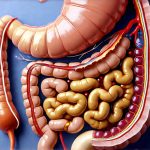Attention Deficit Hyperactivity Disorder (ADHD) is increasingly recognized not as solely a neurological condition, but as one potentially influenced by a complex interplay between genetic predisposition, environmental factors, and emerging research suggests, the intricate ecosystem within our gut – the gut microbiota. Traditional approaches to managing ADHD have largely focused on pharmacological interventions and behavioral therapies. However, growing evidence points toward the “gut-brain axis” as a crucial area for exploration, offering potential complementary strategies to support cognitive function and symptom management. This connection is bidirectional; what happens in your gut can impact your brain, and vice versa, creating a dynamic relationship that’s proving vital to understanding overall health, including mental wellbeing.
The human gut harbors trillions of microorganisms—bacteria, fungi, viruses, and other microbes—collectively known as the gut microbiota. These aren’t simply passengers; they play essential roles in digestion, nutrient absorption, immune system regulation, and even neurotransmitter production. Disruptions to this delicate balance, termed dysbiosis, have been linked to a wide range of health issues, including anxiety, depression, and increasingly, ADHD symptoms. Understanding how the gut microbiota influences brain function is key to unlocking new avenues for supporting individuals with ADHD, moving beyond solely addressing surface-level symptoms toward promoting long-term cognitive balance and wellbeing. This understanding can also be beneficial when considering hormonal balance as it relates to overall health.
The Gut-Brain Axis And ADHD: A Deep Dive
The gut-brain axis (GBA) represents a complex communication network between the gastrointestinal tract and the brain. This isn’t just a metaphorical link; it’s a physiological system involving neural, hormonal, immune, and metabolic pathways. Signals travel in both directions – from the gut to the brain, and vice versa – influencing mood, cognition, and behavior. Several mechanisms underpin this communication:
- The vagus nerve acts as a direct pathway for signals between the gut and the brain.
- Short-chain fatty acids (SCFAs), produced by bacterial fermentation of dietary fiber in the gut, can influence brain function.
- The immune system is significantly impacted by the gut microbiota, with imbalances potentially leading to inflammation that affects brain health. Understanding gut inflammation can shed light on these processes.
- Neurotransmitters like serotonin and dopamine, crucial for attention and motivation, are partially synthesized in the gut and influenced by microbial activity.
In ADHD, alterations in the GBA may contribute to several key symptoms. For instance, dysbiosis can lead to increased intestinal permeability (“leaky gut”), allowing inflammatory molecules to enter the bloodstream and potentially affect brain function. Furthermore, imbalances in the microbiota can impact neurotransmitter production, leading to deficits in dopamine and norepinephrine, which are often implicated in ADHD. Studies have begun to reveal differences in the gut microbiome composition between individuals with and without ADHD, suggesting a potential causal link rather than merely correlation. This research is still evolving, but it highlights the profound influence of the gut on brain health and cognitive function.
The growing body of evidence suggests that targeting the gut microbiota could offer a complementary approach to managing ADHD symptoms. While not a cure-all, optimizing gut health may support improved attention, focus, emotional regulation, and overall wellbeing for individuals facing challenges with ADHD. This isn’t about replacing conventional treatments but rather integrating strategies that address underlying biological factors contributing to the condition. In some cases, even exploring fasting and refeeding can offer beneficial results.
Dietary Interventions & Gut Health For Cognitive Balance
Diet plays a pivotal role in shaping the composition of the gut microbiota. A diet rich in processed foods, sugar, and unhealthy fats can promote dysbiosis, while a diet abundant in fiber-rich fruits, vegetables, whole grains, and fermented foods supports a diverse and healthy microbial community. Specific dietary strategies may be particularly beneficial for individuals with ADHD:
- Increase Fiber Intake: Fiber serves as food for beneficial gut bacteria, promoting their growth and production of SCFAs. Good sources include oats, beans, lentils, apples, berries, and broccoli.
- Incorporate Fermented Foods: Foods like yogurt (with live cultures), kefir, sauerkraut, kimchi, and kombucha contain probiotics—live microorganisms that can help restore microbial balance.
- Reduce Sugar & Processed Foods: These contribute to inflammation and disrupt the gut microbiome, exacerbating ADHD symptoms.
- Consider an Elimination Diet: Identifying food sensitivities through a carefully monitored elimination diet may help reduce inflammation and improve gut health. This should be done under the guidance of a healthcare professional.
Beyond specific foods, the timing and pattern of eating can also impact the gut microbiota. Intermittent fasting, for example, has shown promise in modulating gut microbial composition and improving cognitive function in some studies. However, it’s essential to approach dietary changes cautiously and consider individual needs and tolerances. Dietary interventions should always be part of a holistic approach and ideally guided by a registered dietitian or healthcare provider. It’s not about restrictive dieting but rather focusing on nourishing the body with whole, unprocessed foods that support gut health and cognitive function.
Probiotics & Prebiotics: A Closer Look
Probiotics are live microorganisms that, when administered in adequate amounts, confer a health benefit on the host. They can be found in fermented foods or taken as supplements. Prebiotics, on the other hand, are non-digestible fibers that serve as food for probiotics, promoting their growth and activity within the gut. The combination of both is often referred to as synbiotics.
Research into probiotic supplementation for ADHD is still emerging, but some studies have shown promising results in reducing hyperactivity, impulsivity, and improving attention. However, it’s crucial to understand that not all probiotics are created equal. Different strains have different effects, and the optimal strain(s) for ADHD may vary from person to person. Furthermore, probiotic efficacy depends on factors like dosage, delivery method, and individual gut microbiome composition. Selecting a high-quality probiotic supplement with well-researched strains is vital.
Prebiotics are equally important in supporting a healthy gut ecosystem. By providing nourishment for beneficial bacteria, prebiotics help maintain microbial diversity and promote SCFA production. Foods rich in prebiotics include garlic, onions, leeks, asparagus, bananas, and oats. Increasing prebiotic intake through diet or supplementation can enhance the effectiveness of probiotics and contribute to overall gut health. It’s important to gradually increase fiber intake to avoid digestive discomfort.
The Role Of Inflammation & Gut Permeability
Chronic inflammation is increasingly recognized as a contributing factor in many neurodevelopmental conditions, including ADHD. Dysbiosis can trigger an inflammatory response within the gut, leading to increased intestinal permeability—often referred to as “leaky gut.” When the gut lining becomes more permeable, larger molecules and toxins can enter the bloodstream, activating the immune system and promoting systemic inflammation.
This systemic inflammation can impact brain function in several ways: it disrupts neurotransmitter synthesis, impairs neuronal signaling, and damages brain cells. In ADHD, this inflammatory cascade may exacerbate symptoms like impulsivity, inattention, and emotional dysregulation. Addressing gut permeability through dietary changes (reducing inflammatory foods), probiotic supplementation, and stress management techniques can help reduce inflammation and support cognitive function.
Furthermore, certain nutrients play a crucial role in maintaining gut barrier integrity and reducing inflammation. Omega-3 fatty acids, found in fatty fish, flaxseeds, and chia seeds, have anti-inflammatory properties and can help strengthen the gut lining. Vitamin D, obtained through sunlight exposure or supplementation, is also essential for immune function and gut health. It’s important to consult with a healthcare professional before starting any new supplement regimen.
Stress Management & The Gut Microbiota Connection
Stress profoundly impacts the gut microbiota, creating a vicious cycle where stress disrupts microbial balance, leading to increased inflammation, which further exacerbates stress responses. Chronic stress can lead to dysbiosis, decreased intestinal permeability, and altered neurotransmitter production—all of which contribute to ADHD symptoms.
Implementing effective stress management techniques is therefore crucial for supporting both gut health and cognitive function in individuals with ADHD. Techniques like mindfulness meditation, yoga, deep breathing exercises, and regular physical activity have been shown to reduce stress levels and positively influence the gut microbiota. Creating a supportive social network and prioritizing self-care are also essential components of stress management.
The connection between stress and the gut highlights the importance of a holistic approach to ADHD management. Addressing emotional wellbeing alongside dietary interventions and other strategies can significantly improve overall health and cognitive balance. Prioritizing mental health is not just beneficial for emotional wellbeing; it’s also vital for supporting a healthy gut ecosystem. Understanding gut bacteria can offer additional insights.
It’s crucial to reiterate that this information is for educational purposes only and should not be considered medical advice. Always consult with qualified healthcare professionals before making any changes to your diet, treatment plan, or supplement regimen. The field of gut microbiota research is rapidly evolving, and ongoing studies will continue to shed light on the complex relationship between the gut and brain in ADHD. Gut biofeedback may also prove helpful for some individuals. Additionally, consider exploring how gut microbiome balance can influence overall health. Finally, be mindful of the impact of gut inflammation on your wellbeing.


















